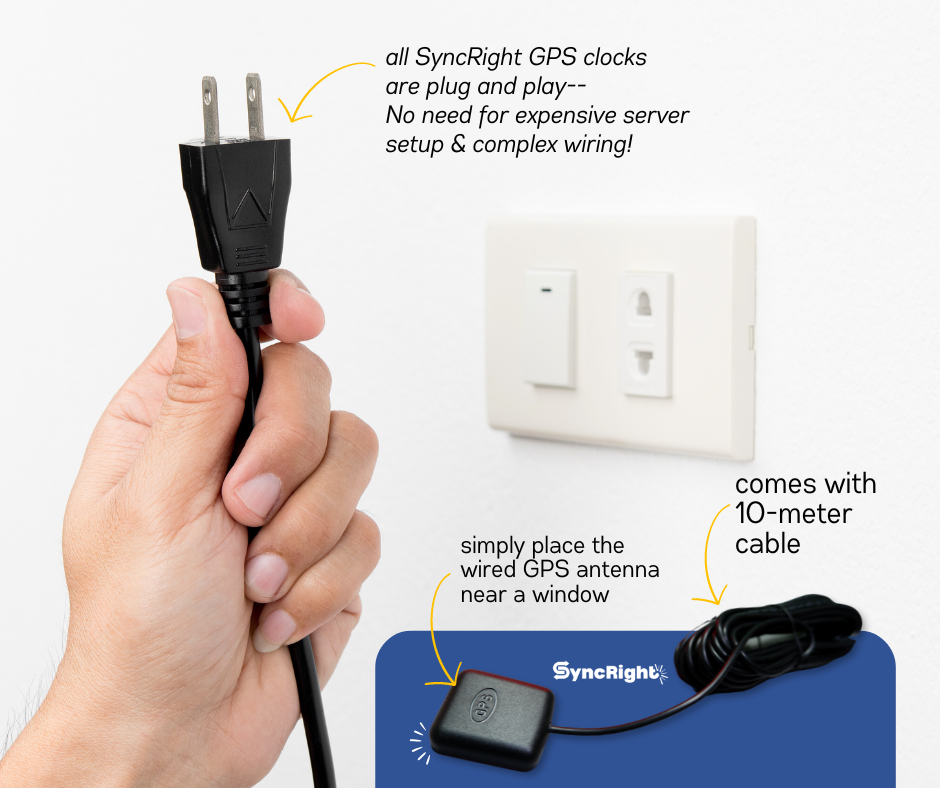Time is an invaluable asset in the workplace, and the way it’s managed can make or break an organization’s success. For human resource directors and business leaders, fostering a culture of punctuality isn’t just about good manners; it’s a strategic imperative with tangible benefits backed by data. This article delves into a data-driven approach to time management, offering practical strategies and emphasizing the role of GPS clocks as a powerful tool for achieving time synchronization and maximizing workplace efficiency.
The High Cost of Tardiness: A Data-Driven Perspective
While occasional tardiness may seem trivial, its cumulative effect can be staggering. Research shows that:
- Lost Productivity: A study by the American Management Association found that chronic lateness costs companies an average of 3.5 hours per employee per week. Extrapolate this across your entire workforce, and the lost productivity adds up quickly.
- Financial Impact: In the Philippines, a 2019 study estimated that traffic congestion alone costs the economy a staggering ₱3.5 billion daily due to lost productivity and increased fuel consumption. While not directly linked to tardiness, it highlights the economic impact of time-related issues.
- Employee Morale: A survey by Accountemps revealed that 45% of employees feel frustrated when colleagues are consistently late, leading to decreased morale and potential conflicts.
- Client Dissatisfaction: Late deliveries, missed deadlines, and delayed responses can damage client relationships and lead to lost business opportunities.
The Punctuality Payoff: A Wealth of Benefits
Conversely, organizations that prioritize punctuality reap a host of benefits:
- Increased Productivity: Employees who value time tend to be more focused, efficient, and results-oriented. Punctuality can lead to increased output, faster project completion, and greater innovation.
- Improved Collaboration: When team members respect each other’s time, meetings are more productive, projects stay on track, and collaboration thrives. This fosters a positive and respectful work environment.
- Enhanced Reputation: A reputation for punctuality and reliability can attract top talent, build stronger client relationships, and elevate your brand image.
- Reduced Stress: A culture of punctuality minimizes the last-minute rush, alleviating stress for both employees and managers. This contributes to a healthier and more engaged workforce.
Real-World Applications: Punctuality in Action
Real-world examples illustrate the power of punctuality:
- Virgin Atlantic: The airline implemented a punctuality improvement program that led to a 40% reduction in flight delays, improving customer satisfaction and boosting revenue.
- Toyota: The automotive giant’s “just-in-time” manufacturing philosophy, which relies on precise timing and coordination, has been a key factor in its success.
- Google: The tech company’s data-driven approach to time management has been instrumental in its ability to maintain its competitive edge and drive innovation.
A Data-Driven Approach to Time Management
To systematize punctuality and time management, consider the following data-driven strategies:
- Track and Analyze: Utilize time-tracking software to gather data on how employees spend their time. Identify patterns of tardiness, bottlenecks in workflows, and areas for improvement.
- Set Clear Expectations: Establish clear policies regarding punctuality and attendance. Communicate these expectations during onboarding and reinforce them through regular reminders.
- Incentivize Punctuality: Consider implementing reward systems for employees who consistently demonstrate good time management. This could include bonuses, extra time off, or other recognition programs.
- Provide Training and Resources: Offer workshops on time management techniques, project planning, and prioritization. Encourage employees to utilize tools like calendars, project management software, and productivity apps.
- Empower Employees: Encourage autonomy and flexibility in work schedules where possible. Allowing employees to have some control over their time can boost morale and productivity.
- Address Underlying Issues: If tardiness is a recurring problem, investigate the root causes. Are there systemic issues like inadequate staffing or unrealistic deadlines that need to be addressed?
- Use Technology to Your Advantage: Implement tools like GPS clocks to ensure accurate and synchronized timekeeping across your organization. This eliminates discrepancies and ensures everyone is on the same page.
GPS Clocks: The Ultimate Time Synchronization Tool
GPS clocks are a game-changer for organizations seeking to optimize time management. By synchronizing with atomic clocks aboard GPS satellites, they offer unparalleled accuracy and reliability. Here’s how they can benefit your workplace:
- Eliminate Time Discrepancies: Different clocks within your organization may show slightly varying times. GPS clocks ensure everyone operates on the same precise time, down to the second.
- Automatic Updates: GPS clocks automatically adjust for daylight saving time and leap seconds, eliminating the need for manual adjustments and reducing the risk of human error.
- Philippine Standard Time Compliance: Easily configure GPS clocks to adhere to the Philippine Standard Time (PST) Act of 2013, ensuring legal compliance.
- Enhanced Data Collection: GPS clocks can integrate with time and attendance systems, providing accurate data for payroll, project management, and performance evaluations.
- Increased Efficiency: With accurate timekeeping, you can streamline processes, optimize scheduling, and minimize downtime.
Real-World Application: GPS Clocks in a Manufacturing Plant
In a Philippine manufacturing plant, the installation of GPS clocks across the facility led to a significant reduction in production delays. With all departments synchronized to the same precise time, the company achieved a 15% increase in productivity and a 10% reduction in overtime costs.
The Time to Act is Now
Punctuality is more than just a virtue; it’s a strategic advantage that can propel your organization to new heights. By adopting a data-driven approach to time management, implementing effective strategies, and leveraging the power of GPS clocks, you can create a workplace culture where time is respected, productivity soars, and success becomes the norm.










